December TCAID: In Focus - Trinity Centre for Ageing and Intellectual Disability 2024: A Year of Progress and Impact
As 2024 draws to a close, it has been a year of significant advancements for the Trinity Centre for Ageing and Intellectual Disability (TCAID). Through continued research, collaborations, and strategic initiatives, we have furthered our understanding of the challenges faced by adults with intellectual disabilities and made strides in improving their health and quality of life. This year has underscored our ongoing commitment to translating research into actionable solutions and evidence-based practices. As we reflect on the progress of 2024, we look forward to carrying this momentum into 2025, with a continued focus on enhancing care, support, and outcomes for individuals with intellectual disabilities. “ Congratulations to the Trinity Centre for Ageing and Intellectual Disability for your remarkable achievements this year, your tireless dedication to people with intellectual disability, and the incredible events that have showcased the depth and impact of your work in the field. The groundbreaking research and the commitment of the team are not only shaping practice and policy but, most importantly, making a profound difference in the lives of people with intellectual disabilities. Thank you for inspiring us all with your vision and for driving meaningful change that truly matters.” - Prof. Éilish Burke - Director of Research, School of Nursing and MidwiferyWave 6 of IDS-TILDA Approved for HRB Funding: A Milestone Achievement
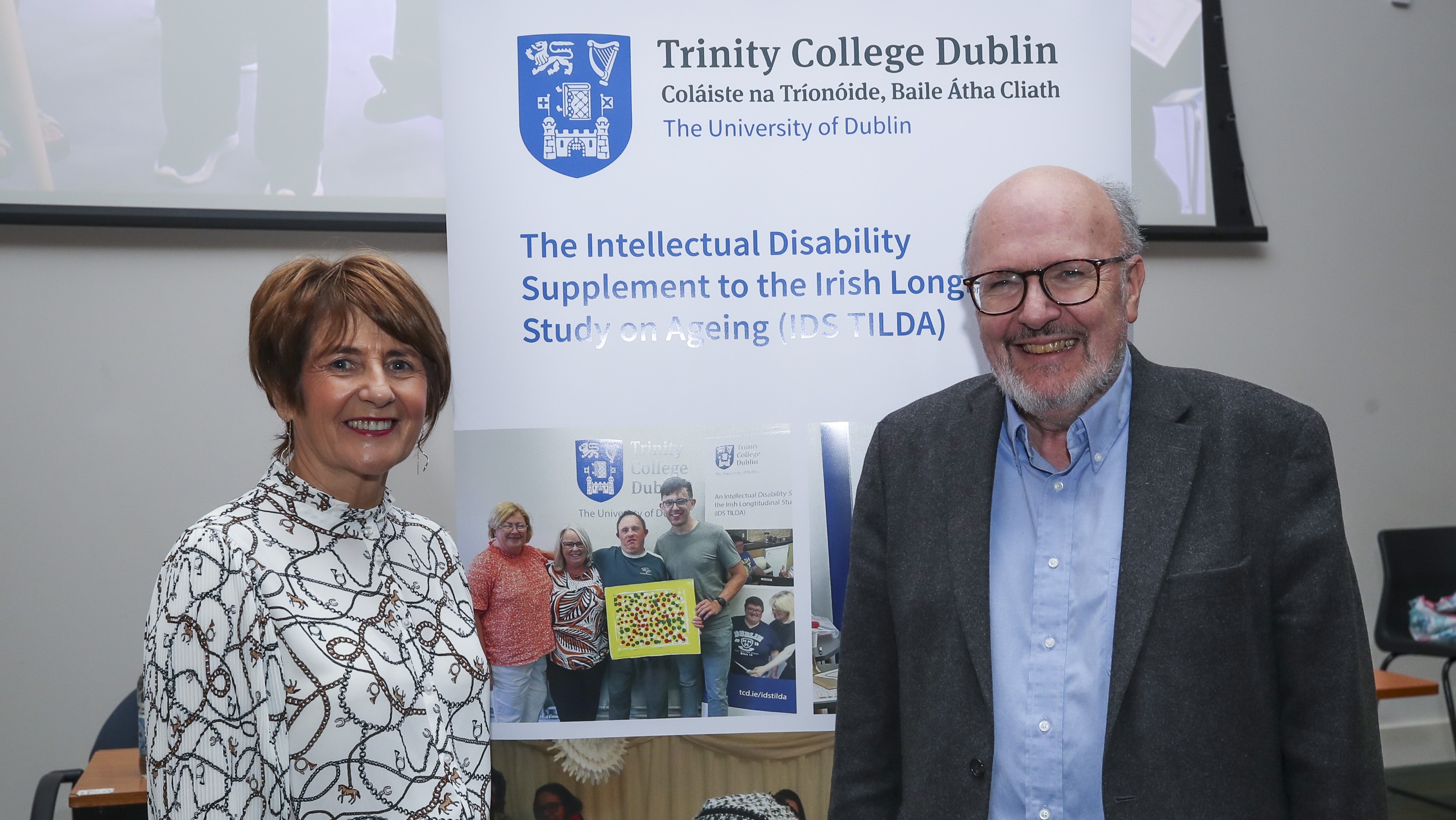
We are pleased to announce that the Health Research Board (HRB) has approved funding of €1.75m for the Intellectual Disability Supplement to the Irish Longitudinal Study on Ageing (IDS-TILDA) Wave 6, led by Professor Mary McCarron.
This significant milestone follows a positive evaluation by the HRB board and reflects the continued importance of the IDS-TILDA study in addressing health inequities faced by adults with intellectual disabilities as they age.
With this funding, the next phase of this vital research can now move forward, generating valuable data to inform evidence-based policies and practices. It also marks an exciting new chapter for IDS-TILDA, cementing its position as a global leader in aging and intellectual disability research, and supporting the development of policies and practices to improve health outcomes for this often underserved population.
Left to right: Prof. Mary McCarron and Prof. Philip McCallion
In Gratitude, In Memory, In Celebration: IDS-TILDA Commemorative Ceremony
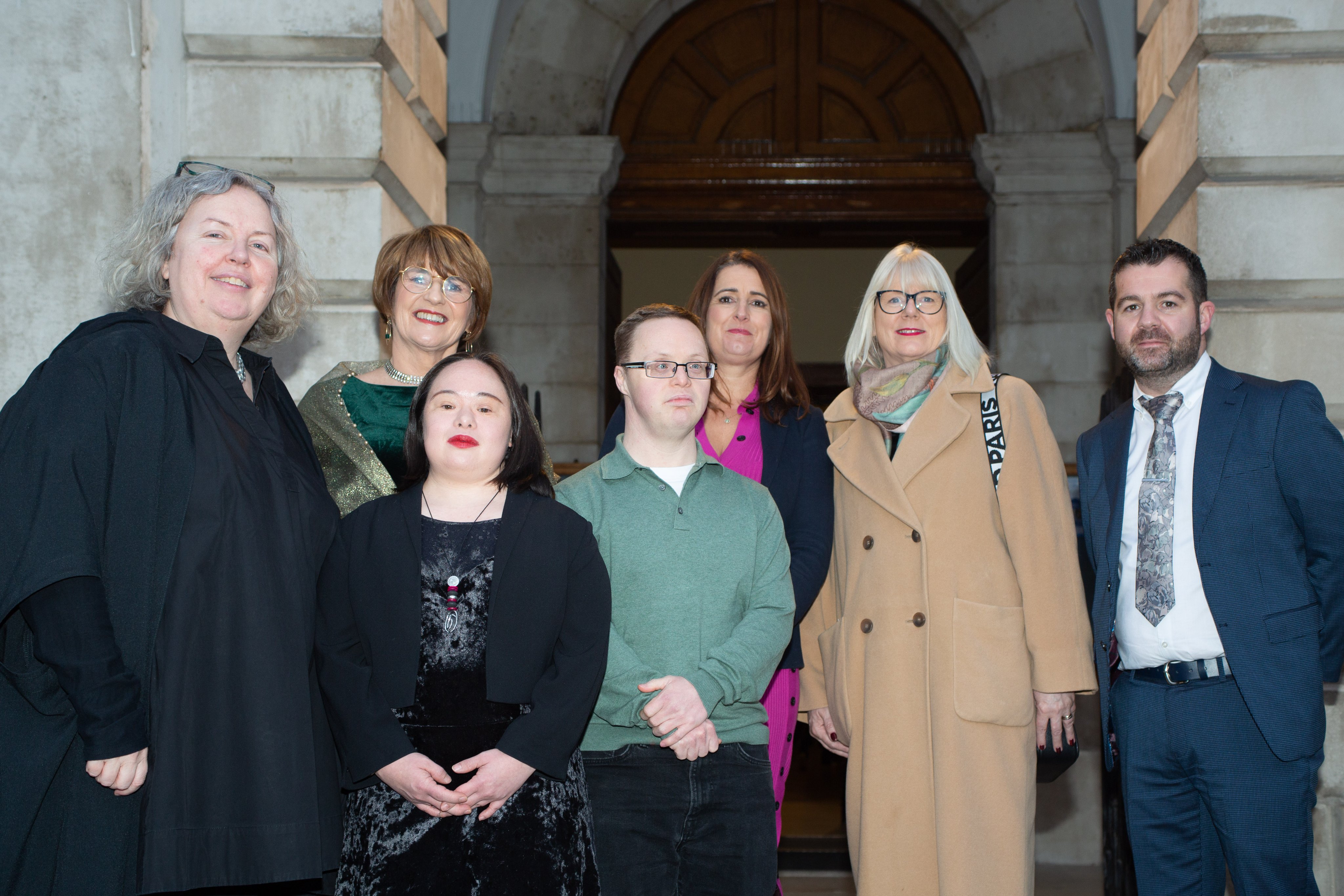
Trinity Centre for Ageing and Intellectual Disability (TCAID) hosted a special commemoration ceremony in the Trinity Chapel to mark International Day of Persons with Disabilities, honouring the lives and contributions of individuals who participated in IDS-TILDA.
The theme, “In Gratitude, In Memory, In Celebration,” was reflected in the readings and performances by individuals with intellectual disabilities, highlighting gratitude for participants’ contributions, the respectful remembrance of those who have passed, and the celebration of their lives, as well as the impact their participation in IDS-TILDA has had on advancing research and care.
Over 270 deceased participants were remembered in a moving tribute that featured readings and musical performances by musicians from Viewpoint Self-Advocacy Group of Sunbeam House Services and Mr David Banfield.
Left to right: Provost Dr. Linda Doyle, Prof. Mary McCarron, Ms. Mei Lin Yap, Mr. James Kelly, Ms. Karen Charnley, Prof. Éilish Burke and Dr. Martin McMahon
Integrating Disability Evidence into Action for Supports and Services (IDEAS 2024) for Older People with an Intellectual Disability, Translating IDS-TILDA Knowledge into Policy and Practice
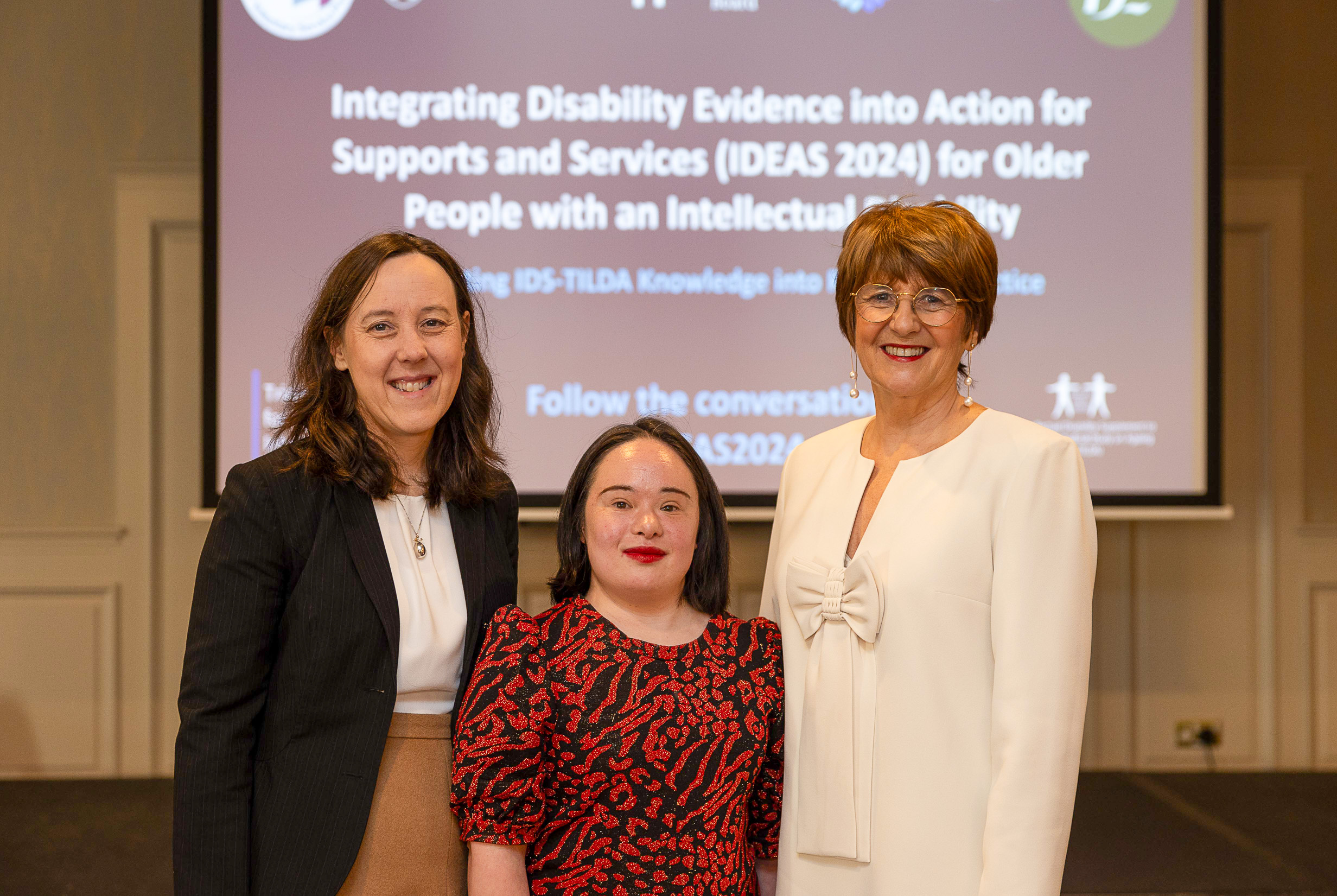
In collaboration with the National Federation of Voluntary Service Providers and the HSE’s Clinical Programme for People with Disability, the Trinity Centre for Ageing and Intellectual Disability (TCAID) held a two-day conference, IDEAS 2024, bringing together experts, researchers, service providers, and advocates dedicated to advancing the care of older adults with intellectual disabilities. The event emphasised the vital role of research in shaping evidence-based policy and practice.
Day one highlighted the application of IDS-TILDA research to enhance social inclusion, physical well-being, and care practices, while day two focused on the critical role of family caregiving and included a consultation with the Commission for the Care of Older People. The conference featured impactful presentations, personal insights, and opportunities for direct input into national policy, underscoring its commitment to improving quality of life through informed care practices.
Read more about the event here:Left to right: Dr. Alison Harnett, Ms. Mei Lin Yap and Prof. Mary McCarron
Strengthening Policy for People with Intellectual Disabilities: Presentation to the Joint Oireachtas Committee on Disability Matters
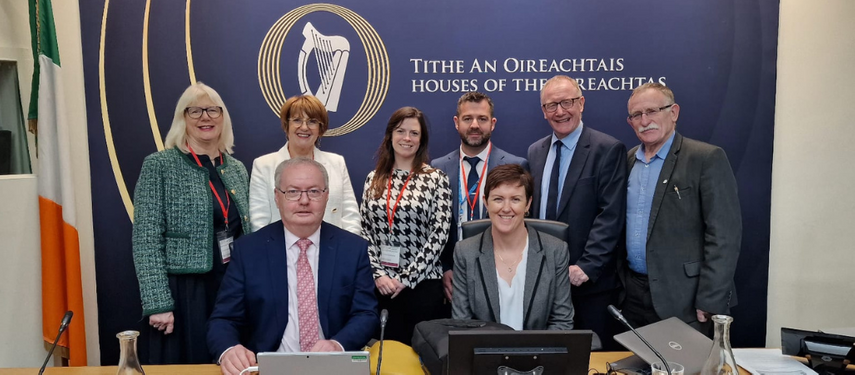
Prof. Mary McCarron, Prof. Éilish Burke, Dr. Martin McMahon, and Dr. Eimear McGlinchey presented to the Joint Oireachtas Committee on Disability Matters on future-proofing to improvefuture proofing longevity of persons with disabilities. They shared findings from IDS-TILDA, emphasising its role in documenting significant improvements in the lives of people with intellectual disabilities, particularly for those with mild to moderate disabilities and those living outside residential care. However, they also highlighted ongoing challenges, including preventable and treatable mortality, inequities in healthcare access, and poorly understood health issues. The presentation underscored Ireland's leadership in having the strongest global data on the physical and social determinants of health and wellbeing for this population, calling for its strategic use to inform policy and support aging with dignity and pride.
Click here to read more and view the full presentationLeft to right: Prof. Eilish Burke, Prof. Mary McCarron, Mr. Michael Moynihan, TD, Cathaoirleach, Dr. Eimear McGlinchey, Dr. Martin McMahon, Ms. Pauline Tully, TD, Leas-Chathaoirleach, Mr. Frankie Feighan, TD and Mr. Dessie Ellis, TD
Longitudinal Dynamics in the Ageing of People with an Intellectual Disability: How Evidence from IDS-TILDA can inform and support strategic planning and service delivery.
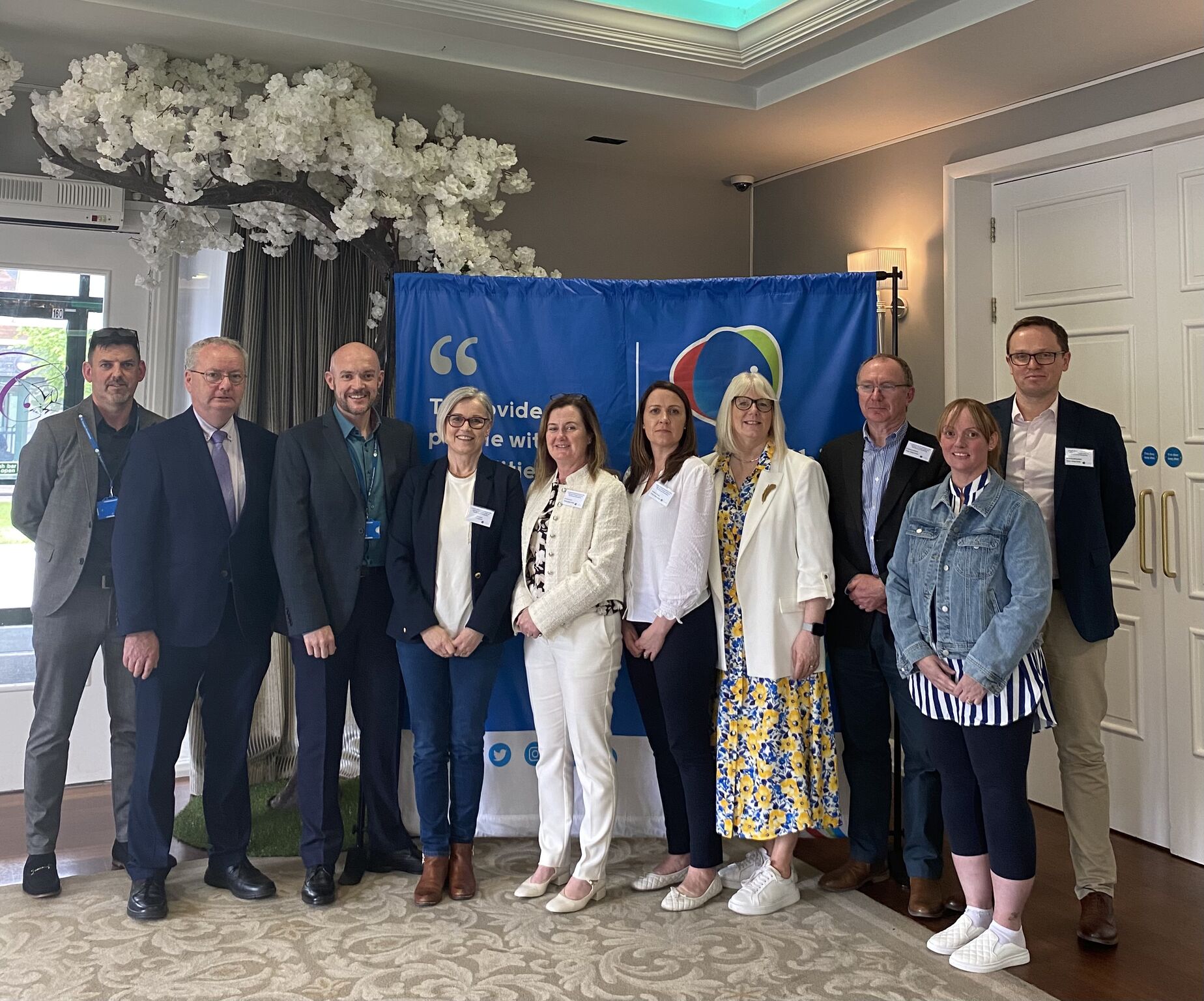
The Trinity Centre for Ageing and Intellectual Disability (TCAID) partnered with St. Joseph’s Foundation and later with Donegal HSE Disability Services and the NMPDU to host a series of one-day conferences focused on applying findings from five waves of the IDS-TILDA study to improve services for older adults with intellectual disabilities. These events, attended by over 100 managers and front-line staff, highlighted data on health, social inclusion, and community participation to support evidence-based strategic planning. Presentations from Prof. Mary McCarron, Dr. Darren McCausland, Prof. Eilish Burke, Dr. Louise Lynch, Dr. Maire O’Dwyer, Dr. Ashleigh Gorman, Dr. Damien Brennan, and Dr. Martin McMahon covered topics such as dementia care, family caregiving, physical health trajectories, brain health, multimorbidity, and social inclusion, emphasizing how this data can shape future strategic planning within disability services. Afternoon workshops fostered collaborative discussions on integrating research into daily operations, while the events underscored the importance of research-informed policies.
Read more about the event in colabortation with St. Joseph's Foundation here:Read more about the event in collaboration with Donegal HSE Disability Services here:
Watch the full conference in collaboration with Donegal HSE Disbability Services here:
Left to right: Dr. Barry Coghlan, Mr. Michael Moynihan, TD, Mr. Michael Hegarty, Ms. Michelle Coughlan , Dr. Louise Lynch, Dr. Maire O'Dwyer, Prof. Éilish Burke, Dr. Damien Brennan, Ms. Catherine Donovan and Dr. Darren McCausland
Sexual and Reproductive Health in Women with an Intellectual Disability
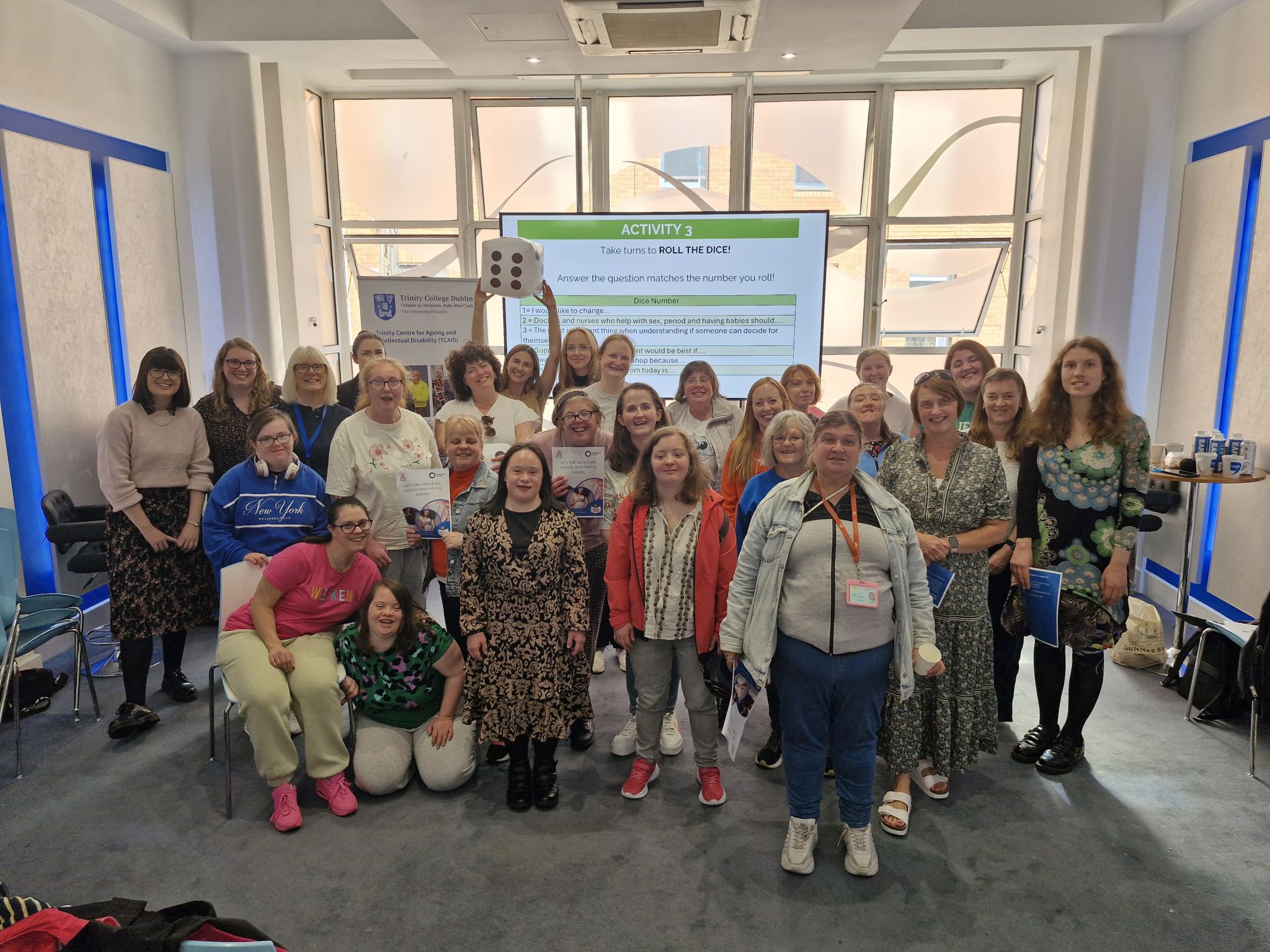
Women with intellectual disabilities are often excluded from discussions about their sexual and reproductive health. To address this, an exciting event was held at the Dublin Chamber, led by Prof. Éilish Burke and Ms. Stephanie Corrigan. The event brought together women with intellectual disabilities, carers, healthcare providers, and representatives from national organisations to address and eliminate the stigma surrounding sexual and reproductive health for women with intellectual disabilities.
Renowned experts, including Dr. Rachael Eastham and Dr. Alex Kaley from the UK, alongside Prof. Mary McCarron, Prof. Éilish Burke, Stephanie Corrigan, and Patricia Blee, delivered insightful presentations. Topics ranged from the history of sexual health access for women with intellectual disabilities to menopause and contraceptive education, with accessible interpretations of all presentations by Ms. Mei Lin Yap, our Ambassador Liaison Officer. A workshop on contraception, consent, and advocacy sparked meaningful dialogue, with feedback highlighting the need for empathetic female healthcare professionals and tailored support for women with higher needs. This event was a pivotal step toward empowering women with intellectual disabilities and ensuring equitable access to health services.
Click here to read morePsychotropic Use in People with Intellectual Disability: How Evidence from the EQUIP study can Inform and Support Policy and Practice
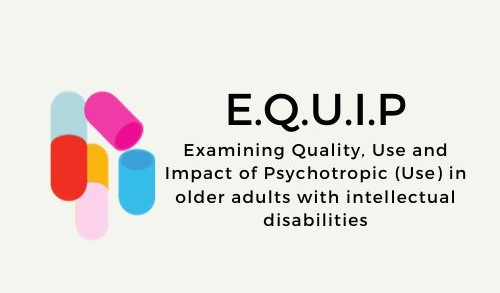
This year, we were thrilled to host a highly attended in person event and subsequent webinar both entitled "Psychotropic Use in People with Intellectual Disability: How Evidence from the EQUIP Study Can Inform and Support Policy and Practice". These events showcased the findings from the EQUIP study, a collaborative research initiative involving the Trinity Centre for Ageing and Intellectual Disability (TCAID) the School of Pharmacy, the HSE National Clinical Programme for People with Disability, the Learning Disability Faculty in the College of Psychiatrists of Ireland, and patient stakeholders. The EQUIP study, funded by the Health Research Board examined the quality and trends of psychotropic medicine use among older adults with intellectual disabilities in Ireland over a decade, aiming to inform policy and optimise health outcomes through improved medicine use. Dr. Maire O’Dwyer (EQUIP PI) presented key findings, followed by the launch of ‘Psychotropic Medicines for Your Mental Health and The People Who Take Them,’ an accessible video showcasing these findings. This was followed by an insightful panel discussion featuring Professor Mary McCarron (TCAID Director and EQUIP co-PI) and Dr. Rosemary Gowran (Clinical Lead, National Clinical Programme for People with Disability).
Click here to access the project page with links to both the webinar and videoEmpowering Voices: Women with Down Syndrome Speak on Health #WDSD2024

World Down Syndrome Day 2024 is an international awareness day for people with Down syndrome. The theme for this year’s World Down Syndrome Day was to End The Stereotypes.
To mark this occasion, we focused on women with Down syndrome to raise awareness of the poor health outcomes often faced by these women. We invited women with Down syndrome from all over the world to share their perspectives on what health means to them. Our aim was to hear from the women about how they manage their own health, what matters most to them, and the ways in which they challenge and overcome stereotypes every day. By listening to their experiences, we hoped to bring attention to the barriers they face in accessing healthcare and to amplify their voices in conversations about health and wellness.
Each of these champions embraced and emphasised the aims of changing the approach to menopause care, aspiring to increase public awareness and support, and examining creatively a way to make access better to information on women’s health at different stages of life.
Most importantly each of these champions were true advocates who wanted to lift the voices of women so that they are active participants in their own health decisions.
Click here to watch the full video
School of Nursing and Midwifery Research Impact Case Study Competition
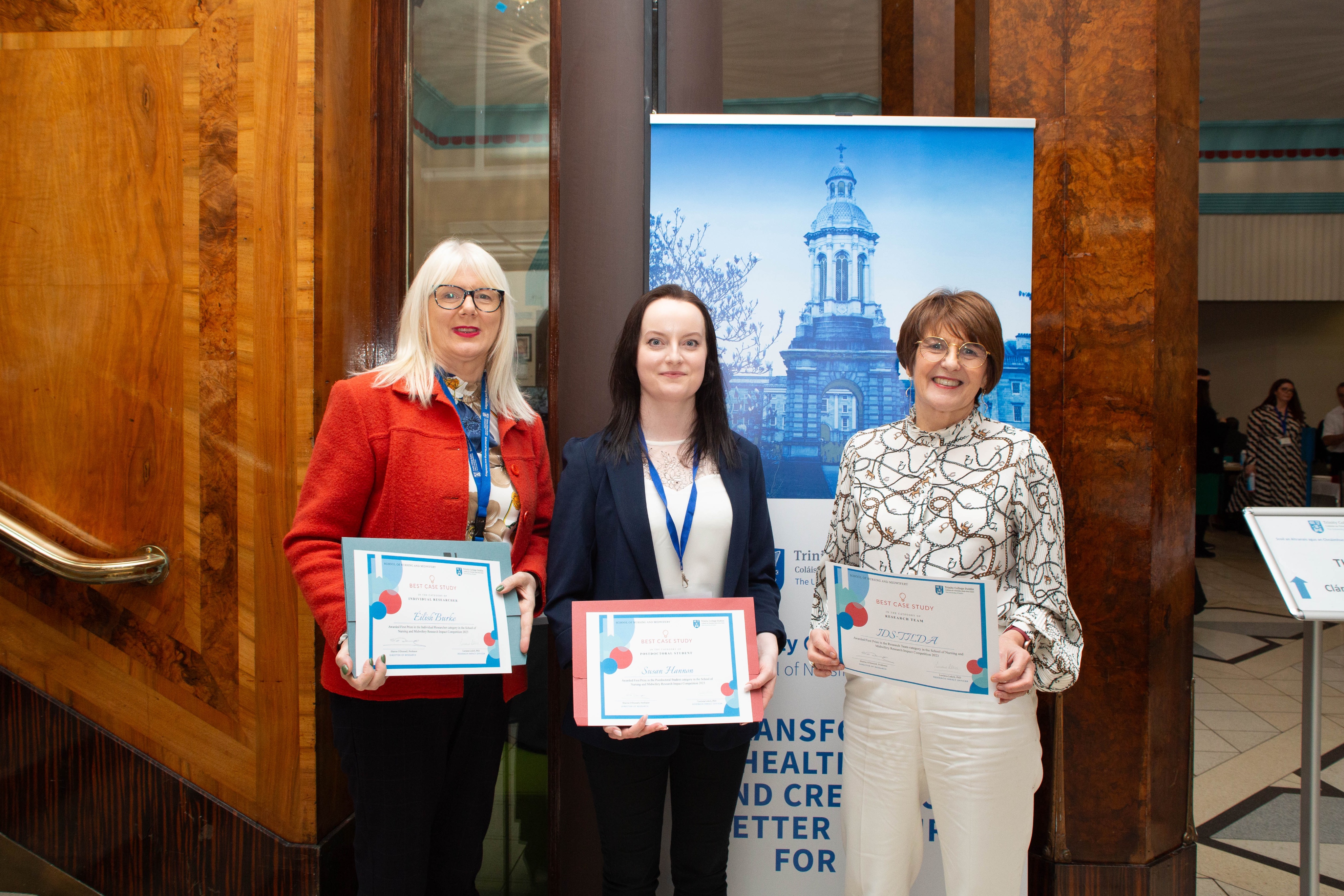
The School of Nursing & Midwifery held the inaugural TCD School of Nursing and Midwifery Research Impact Case Study Competition which encouraged researchers to enter a case study demonstrating the impact of their research. Research Impact Case Studies provide the opportunity to communicate how your research is making a positive impact on healthcare and people’s lives.
Prof. Eilish Burke won the Individual Entry Category for her case study, "Empowering Healthcare: From Research to Practice in Intellectual Disability Health Assessment." This case study addresses health disparities faced by individuals with intellectual disabilities. As community-based care grows, many practitioners lack the training to meet their unique needs. Prof. Burke’s work aims to bridge this gap, improving care and outcomes for this vulnerable group.
Click here to watch a video about Prof. Burke’s winning Case Study
The IDS-TILDA team won the Group Entry Category for their case study, "Transforming Health Care Delivery: Launching the National Intellectual Disability Memory Service,” highlighting the creation of the National Intellectual Disability Memory Service (NIDMS). This centre of excellence focuses on proactive dementia assessment and diagnosis for individuals with intellectual disabilities, with insights from both the NIDMS team and a family carer.
Click here to watch a video about the winning IDS-TILDA Case StudyLeft to right: Prof. Éilish Burke, Dr. Susan Hannon and Prof. Mary McCarron
Inaugural Lecture at Queens University Belfast by Prof. Mary McCarron
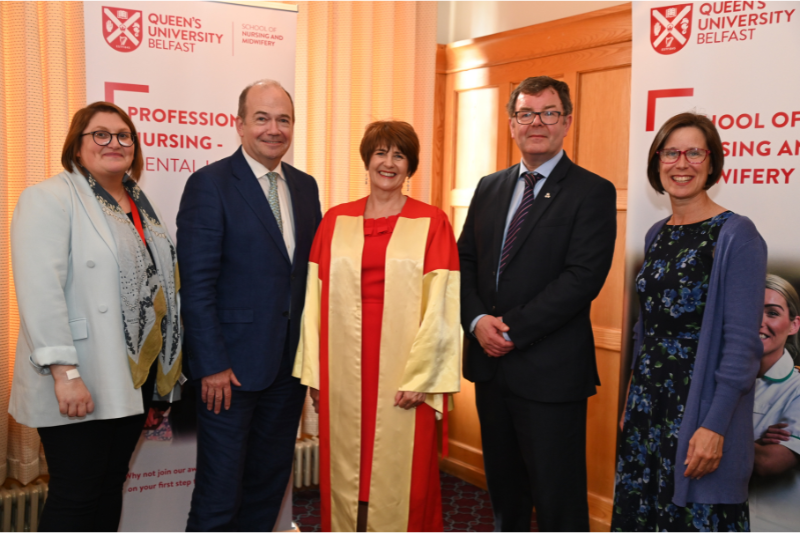
Prof. Mary McCarron hosted her Inaugural Professorial Lecture at Queen's University Belfast, entitled 'Leadership in Academia, Health Research and Health Care: Charting a Personal Journey.' This lecture follows her appointment as an honorary professor at Queen’s School of Nursing and Midwifery the previous year.
To celebrate the occasion, Queen’s University hosted distinguished guests from the Department of Health, the Health and Social Care Trusts, as well as colleagues and students from the University. The lecture was opened by Professor Ian Bruce, Pro-Vice-Chancellor for the Faculty of Medicine, Health and Life Sciences.
The event marked a significant milestone in Prof. McCarron’s career, recognising her contributions to academia, health research, and healthcare. It was an opportunity to reflect on her journey thus far and to acknowledge the continued partnership between Queen’s and her professional work. The event also underscored her ongoing commitment to advancing knowledge and discovery in these fields.
Transforming Dementia Care: Best Practices and Guidelines for People with Intellectual Disabilities

Trinity Centre for Ageing and Intellectual Disability (TCAID) launched the Post-Diagnostic Dementia Support Guidelines. co-funded by the Alzheimer Society of Ireland, the guidelines explore existing post-diagnostic dementia supports for people with intellectual disabilities and identifies ways to improve them.
Developed during the COVID-19 pandemic, these guidelines provide a tailored, person-centred framework to support individuals in aging comfortably in the setting of their choice.
The guidelines aim to equip caregivers and practitioners with tools to deliver compassionate and effective support throughout the dementia diagnosis and treatment process. By fostering informed care, they seek to empower practitioners to make a meaningful difference in the lives of those they serve.
We are proud to share that this project was recently recognised with HCRI’s 2024 Research Impact Award for its far-reaching and wide-ranging contributions to the field.
Click here to access the project page with the reportLeft to right: Dr. Eimear McGlinchy, Ms. Mei Lin Yap, Prof. Mary McCarron, Ms. Pamela Dunne, Ms. Christina Corr and Ms. Nadine Buttery
Advancing Alzheimer's Research for Individuals with Down Syndrome: Insights from the Horizon 21 Consortium Meeting in Dublin
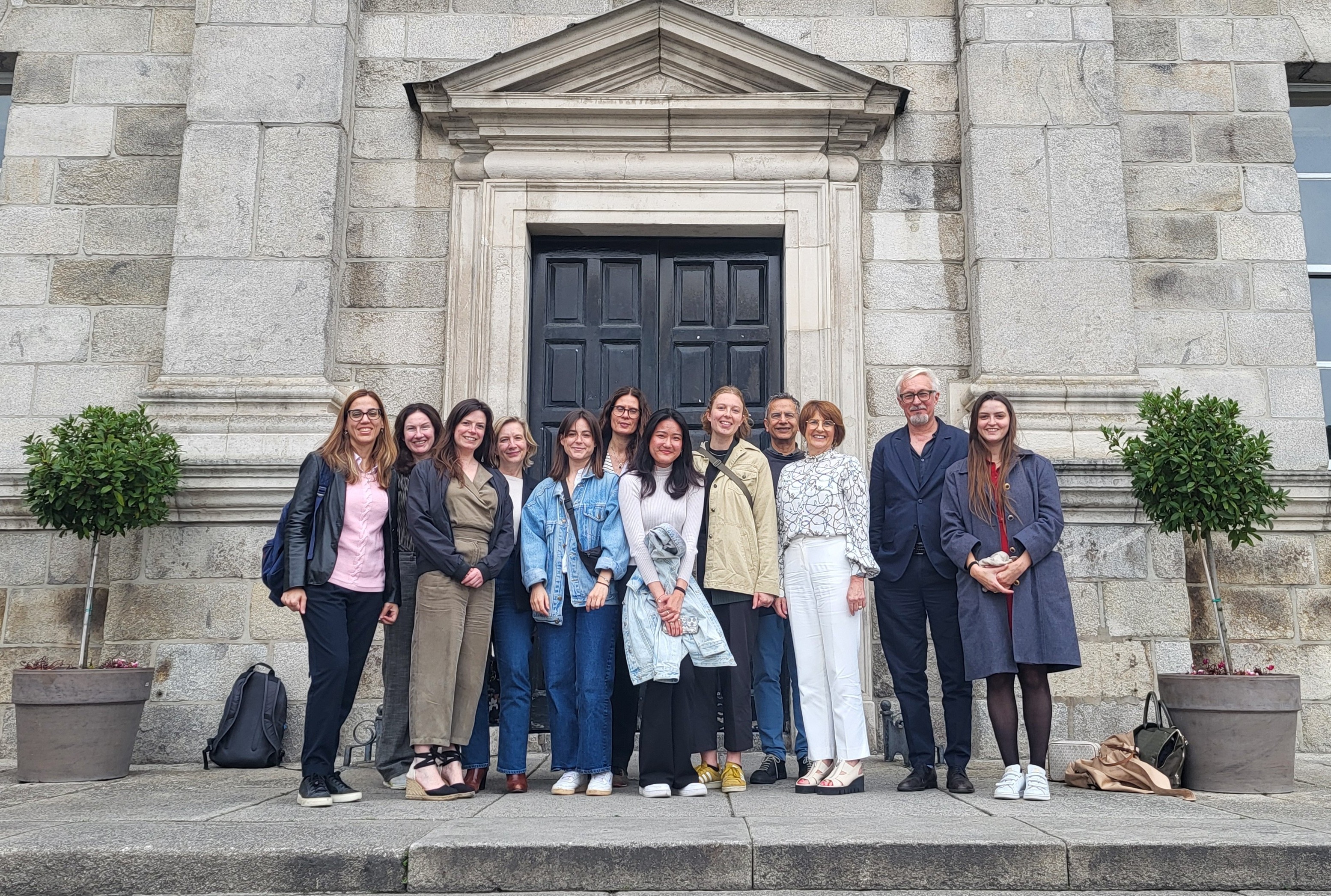
Prof. Mary McCarron, Dr. Eimear McGlinchey, and Ms. Miriam Fitzpatrick of the MINDS project at the Trinity Centre for Ageing and Intellectual Disability (TCAID)hosted the Horizon 21 consortium in Dublin. This international research group, which includes experts from the UK, France, Spain, Greece, Sweden, Germany, and the US, focuses on understanding and preventing Alzheimer’s Disease (AD) in individuals with Down syndrome. Prof. Mark Mapstone from the University of California also presented findings from the Alzheimer Biomarker Consortium: Down Syndrome (ABC-DS) study. The meeting highlighted that while longer life expectancy for individuals with intellectual disabilities presents new research opportunities, it also brings unique challenges. People with Down syndrome are at higher risk for earlier onset of Alzheimer’s Disease, but not all will develop dementia, emphasizing the need for early detection and prevention. Over two days, participants shared updates on trials and explored non-pharmacological interventions such as exercise, diet, sleep, and social connectedness. They also discussed adapting dementia research for Down syndrome, addressing barriers like caregiver support and accessibility. The consortium agreed reconvene later in the year, reaffirming their commitment to advancing research in this critical area.
Click here to read more:Photographed here: Prof. Mary McCarron, Dr. Eimear McGlinchy, Ms. Miriam Fitzpatrick and members of the Horizon 21 Consortium
Echolight one screening device: A feasibility assessment for individuals with an intellectual disability.

The Echolight research project was conducted this year to evaluate the feasibility of the Echolight bone screening device, which measures bone mineral density and diagnoses osteoporosis. Unlike the traditional DXA scan, which can pose significant challenges for individuals with intellectual disabilities, the Echolight device offers a more accessible and user-friendly alternative.
This project was a joint effort between the Trinity Centre for Ageing and Intellectual Disability (TCAID) and Wexford Residential Intellectual Disability Service. It aimed to assess the device’s potential in improving access to bone health diagnostics for individuals with intellectual disabilities, a group often underserved by traditional diagnostic methods.
The study involved 80 participants with varying levels of intellectual disability from four service providers across Ireland. It highlighted the need for accessible and reliable diagnostic tools for this population and demonstrated how Echolight could be a viable alternative for those who cannot undergo DXA scans due to various barriers.
Notably, the Irish Osteoporosis Society recently recognised the Echolight bone screening device for its potential to enhance bone health diagnostics for people with intellectual disabilities. This recognition marks a significant step forward in advancing diagnostics and treatment for bone health in this underserved population.
Left to right: Ms. Jean Moynihan, Ms. Anne Power and Mr. Graham Hughes
Advancing Oral Health for People with Intellectual Disability: Highlighting the Global Impact of MOSST
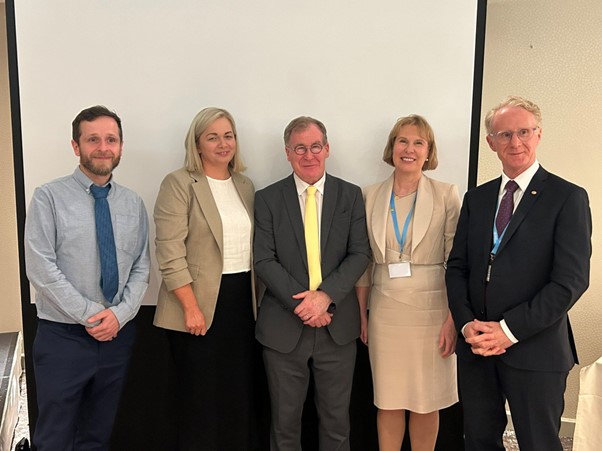
At the 77th World Health Assembly, Ireland hosted a side event on the WHO Global Oral Health Action Plan: Time for Commitment and Action: Defining and Measuring Success of the WHO Global Oral Health Action Plan. The event focused on addressing oral health inequalities in vulnerable groups, with Dr. Dymphna Kavanagh, Chief Dental Officer, presenting the MOSST. The tool’s success in Ireland, particularly within the IDS-TILDA health fair, was showcased as an example of inclusive oral health research aimed at improving care for people with intellectual disabilities.
Building on this momentum, in November, Dr. Caoimhin Mac Giolla Phadraig participated in a WHO side event on the monitoring and surveillance of oral conditions during the Global Oral Health Meeting in Bangkok, Thailand. The MOSST was presented again, with insights shared on its potential to transform oral health data collection, particularly for vulnerable populations. This further emphasizes the tool’s role in advancing inclusive and effective oral health practices globally.
The continued global recognition of MOSST highlights its potential to shape future oral health policies, offering a scalable model for inclusive research and practice in oral healthcare for vulnerable groups worldwide. Its widespread adoption could play a key role in reducing health disparities and ensuring that people with intellectual disabilities receive the care they need.
Click here to read more about the MOSST Training:Left to right: Dr. Caoimhin MacGoilla Phadraig, Ms. Katrina Byrne, Mr. Colm Burke, TD , Dr. Dymphna Kavanagh and Prof. Brian O‘Connell
Improving Cancer Care for Underserved Communities: The EuCan Study
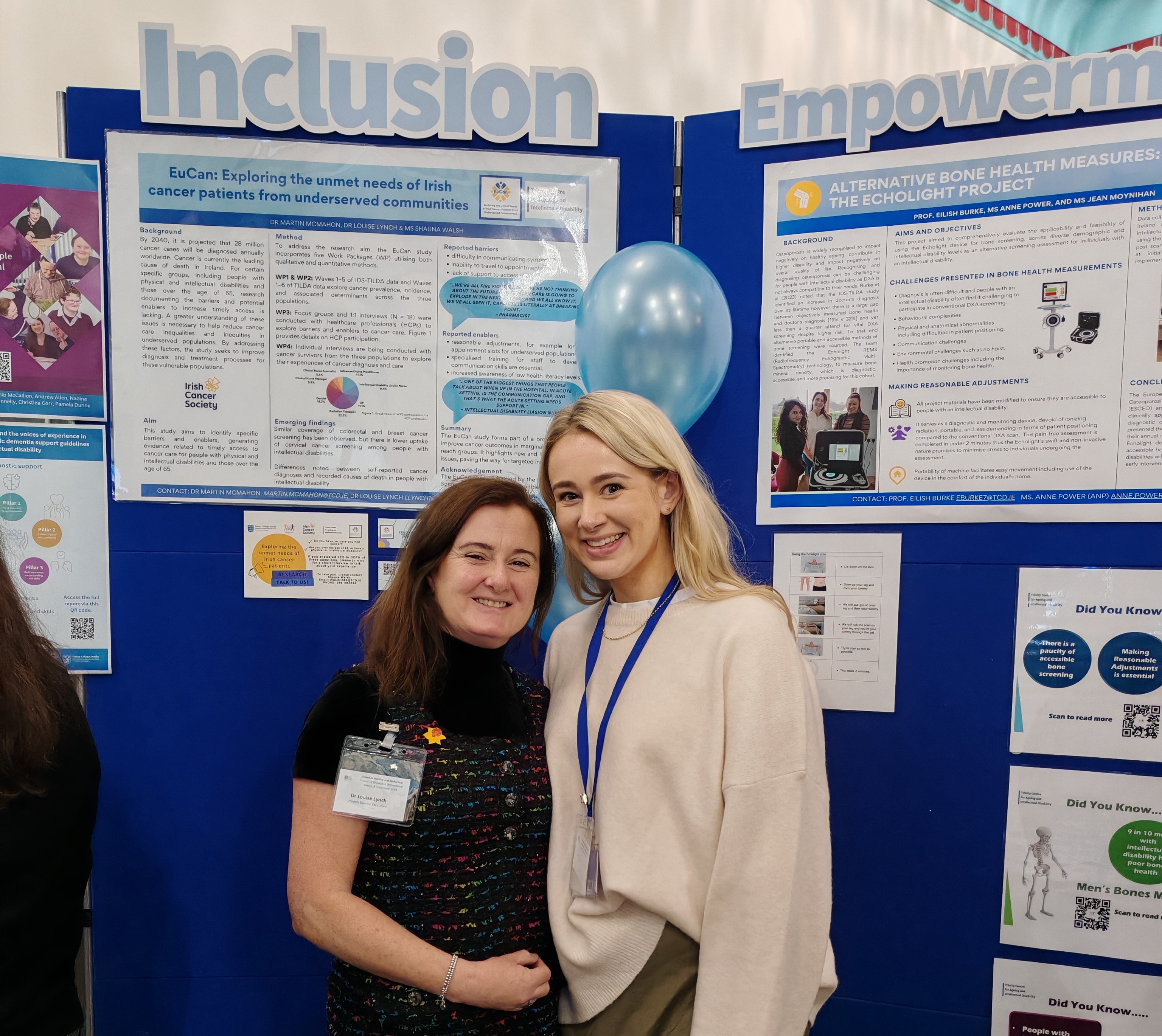
This year, we were very excited to commence the EuCan Study, which explores evidence relating to the barriers to and enablers of timely access to cancer care in underserved populations. These populations include people over the age of 65 and those with physical and intellectual disabilities. The study is funded by the Irish Cancer Society's Underserved Communities Award, awarded to Dr Martin McMahon, Associate Director of TCAID, and supported by Dr Louise Lynch and Shauna Walsh.
We have interviewed Health Professionals to understand their experience and are currently analysing IDS-TILDA and TILDA data and conducting interviews with individuals from underserved populations. Although it is too early to report on the overall findings, emerging findings suggest that people with intellectual disabilities are less likely to receive a cancer diagnosis and are more likely to face barriers when accessing cancer care which is very concerning. The findings from this study will be used by the Irish Cancer Society and other organisations to lobby for change and support the development of policies in this area to ensure equitable cancer care for these populations. Dr McMahon and his team aim to identify actionable measures that can be implemented to ensure that people from underserved communities living with and beyond cancer receive equitable cancer care.
The findings of this study will be reported in during 2025, and all related information will be made available here:Left to right: Dr. Louise Lynch and Ms. Shauna Walsh
SNM Seed Funding Awardee: Exploring Sedentary Behaviour, Obesity, and Cancer in Adults with Intellectual Disabilities
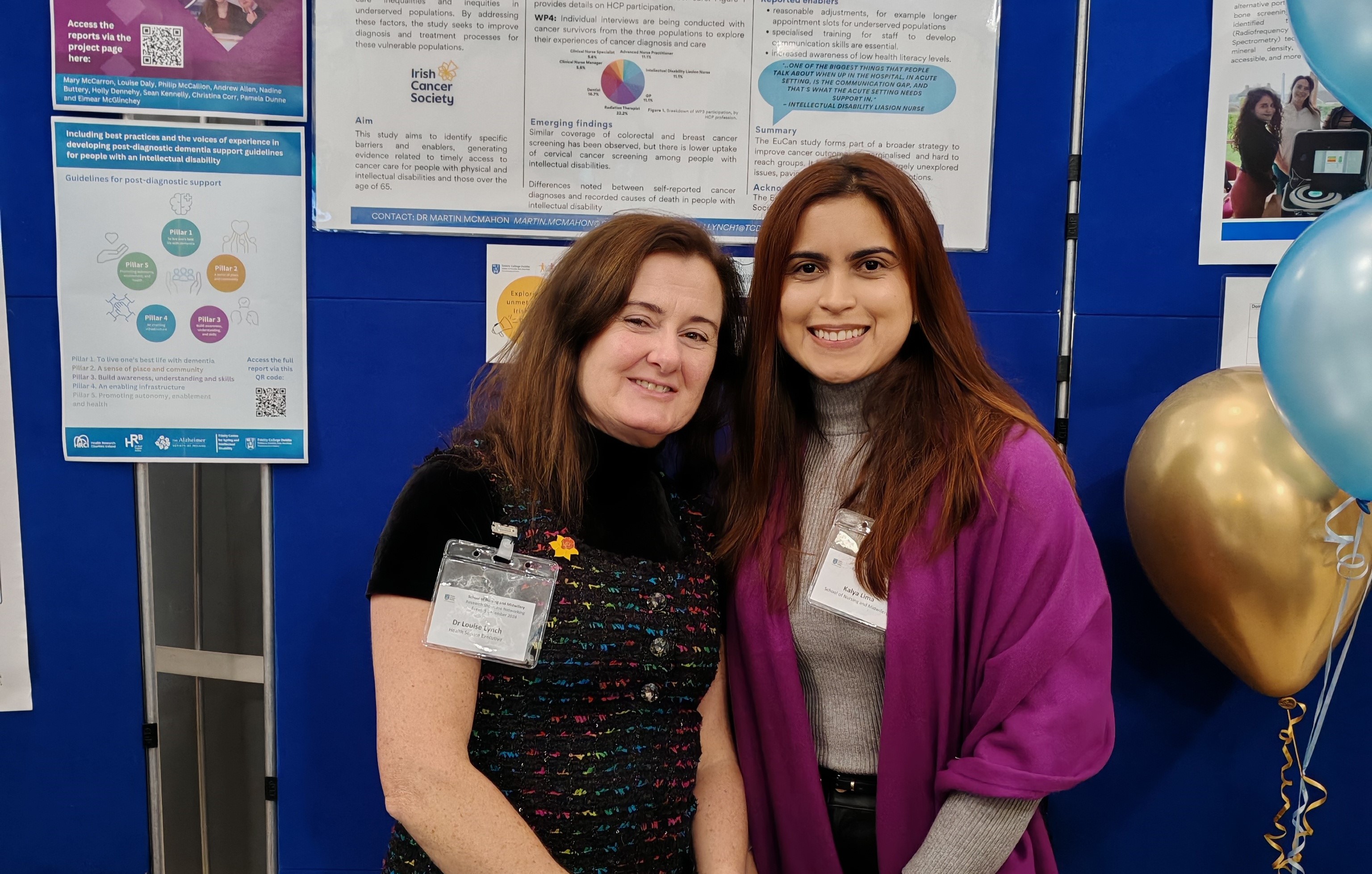
Dr. Louise Lynch was awarded the SNM Seed Funding to conduct a scoping review on the 'Effects of Sedentary Behaviour and Overweight/Obesity on Cancer Outcomes in Adults with Intellectual Disability.' To support this important project, Dr. Kálya Yasmine Lima was recruited to assist with the review process.
The review revealed a significant lack of research in this area. Only two studies investigating the impact of overweight/obesity on cancer outcomes met the criteria for inclusion, and no studies were found on the effects of sedentary behaviour.
These results highlighted a notable gap in the research on sedentary behaviour, overweight/obesity, and cancer among individuals with intellectual disabilities. This critically needs to be addressed as a priority, in order to ensure equitable care and prevention strategies can be developed and tailored to the specific needs of this population.
Left to right: Dr. Louise Lynch and Dr. Kálya Yasmine Lima
IASSIDD 2024 & 2027
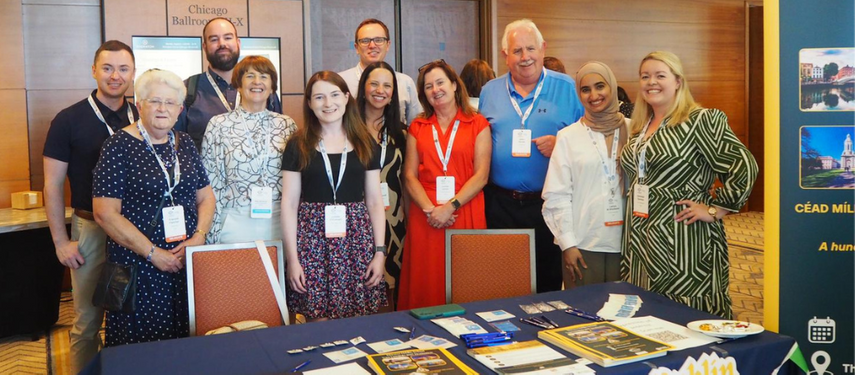
This August, TCAID members attended the 17th International Association for the Scientific Study of Intellectual and Developmental Disabilities (IASSIDD) World Congress in Chicago, where they connected with fellow researchers, delivered 34 impactful presentations, and participated in symposiums and roundtable discussions on key themes such as ageing, Down Syndrome, health issues, and inclusive research.
A highlight of the conference was Professor Mary McCarron’s announcement that Dublin will host the next IASSIDD World Congress in 2027. The event, set for 17-20 August at the Convention Centre in Dublin, will bring together leading experts and offer invaluable opportunities for collaboration and innovation. The successful bid for Dublin to host the congress is a tremendous honour, reflecting the international recognition of both TCAID and the IDS-TILDA study. With an expected turnout of 1,200 to 1,500 participants from around the world, IASSIDD 2027 promises to be a major event for advancing research, building collaborations, and fostering interdisciplinary connections in the field.
Click here to read more:Left to right: Mr. Gavin Dann, Ms. Frances Fletcher, Mr. Des Aston, Prof. Mary McCarron, Dr. Juliette O‘Connell, Ms. Iara Faria Synott, Dr. Darren McCausland, Dr. Louise Lynch, Mr. John Hynes, Dr. Lamya Al Shuhaimi and Dr. Ashleigh Gorman
Recognition of Dr. Aoife McFeely for Outstanding Research on Aging in the Intellectual Disability Community
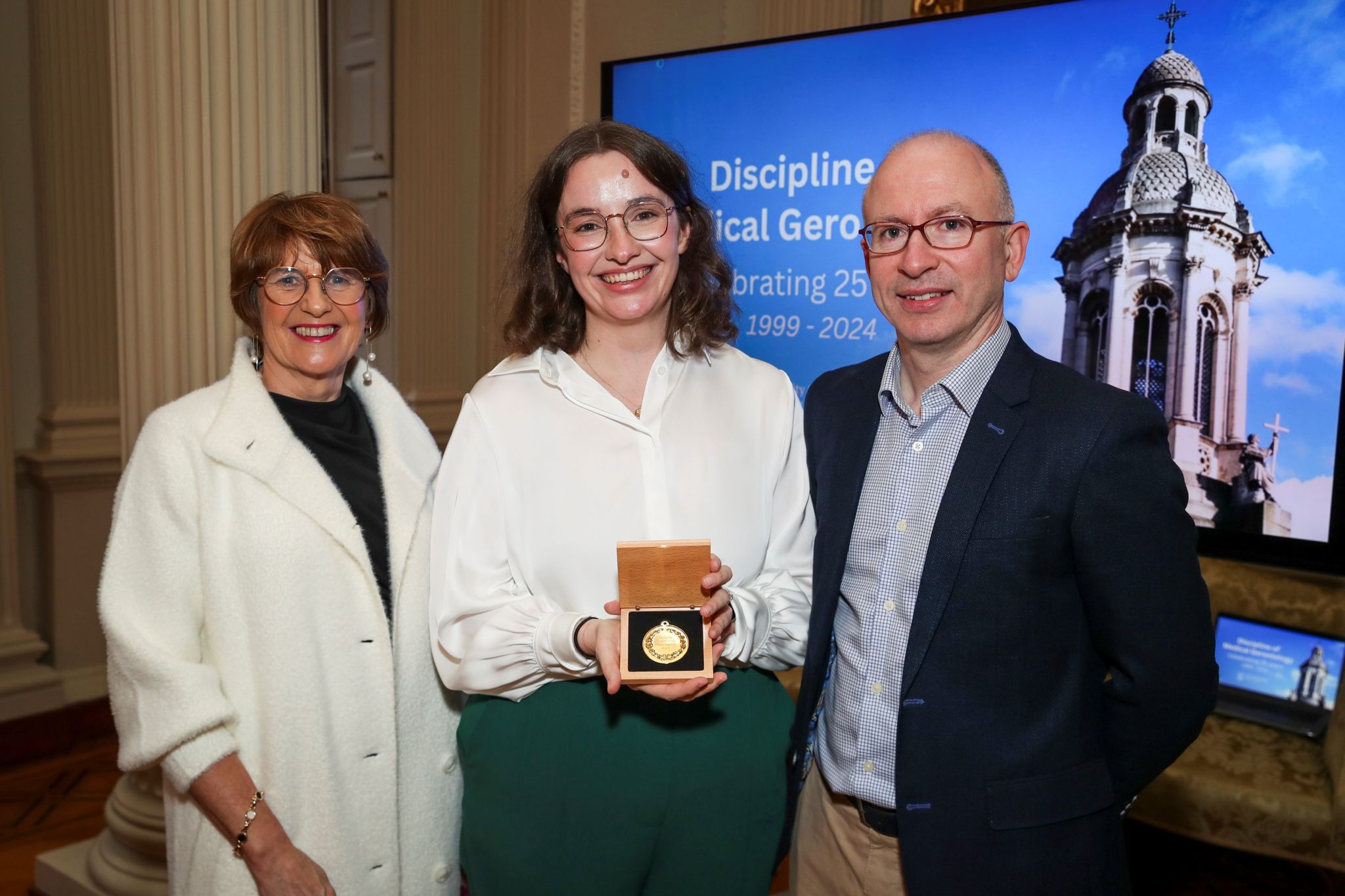
Dr. Aoife McFeely, Specialist Registrar in Geriatric Medicine at Tallaght University Hospital and Medical Doctorate student, was awarded a medal for her exceptional presentation on her research.
Her work, conducted in collaboration with Prof. Mary McCarron and Prof. Sean Kennelly, utilized data from the Intellectual Disability Supplement to the Irish Longitudinal Study of Aging (IDS-TILDA).
Dr. McFeely's presentation, titled "Frailty identification and trajectory in an ageing population with intellectual disability," was honored during the 25th Anniversary celebration of the Discipline of Medical Gerontology.
This prestigious recognition underscores the significant contributions Dr. McFeely has made in advancing the understanding of aging in the intellectual disability community.
Left to right: Prof. Mary McCarron, Dr. Aoife McFeely and Prof. Sean Kennelly
Research on Alzheimer’s Diagnosis and Treatment in Down Syndrome Led by Dr. Antoinette O'Connor, supported by TCAID
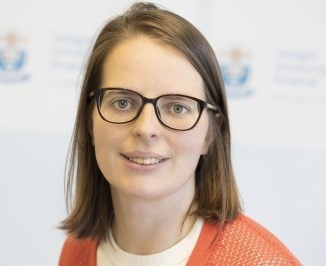
Dr. Antoinette O’Connor, Consultant Neurologist at Tallaght University Hospital (TUH), has received funding from the Health Research Board under their Emerging Clinician Scientist Award to conduct vital new research aimed at diagnosing Alzheimer’s disease (AD) in individuals with Down syndrome through blood tests. Supported by Prof. Mary McCarron and TCAID, this study will explore whether blood biomarkers can be used to detect AD and track the effectiveness of emerging treatments designed to slow disease progression. People with Down syndrome are at an increased risk for developing Alzheimer’s, yet have been excluded from clinical trials for new AD therapies, despite the urgent need for effective treatments in this population.
Dr. O’Connor's research will focus on identifying the most promising blood tests for AD detection in Down syndrome, assessing their variability, and investigating the role of inflammation in disease onset. This study, which will gather repeated blood samples from participants, aims to establish essential biomarkers that could pave the way for non-invasive, accessible methods of diagnosis and treatment monitoring. The results may also open new avenues for addressing inflammation as a potential therapeutic target.
Support from TUH, the Health Research Board, and Prof. McCarron ensures the study’s success in advancing care for individuals with Down syndrome and Alzheimer’s.
Dr Martin McMahon Recognised for Teaching Excellence
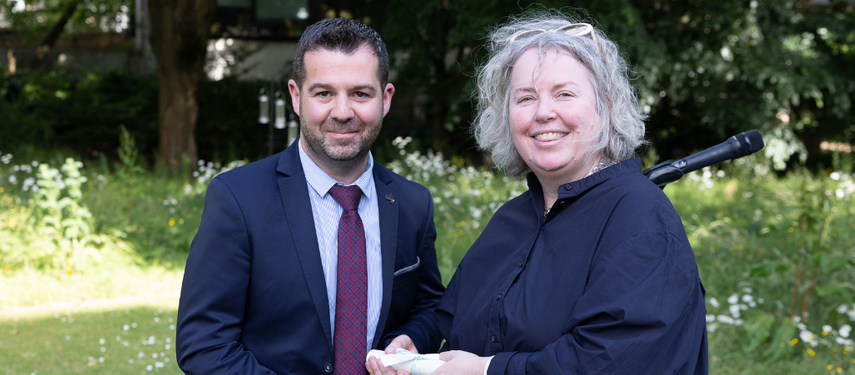
Dr. Martin McMahon was recently presented with the 2024 School Award for Teaching Excellence by the Provost, Dr. Linda Doyle. This prestigious award recognizes Dr. McMahon’s exceptional contribution to education, particularly his ability to create an engaging and impactful learning experience for his students.
The Trinity Excellence in Teaching Awards & School Awards were established to honor those who have made significant contributions to teaching excellence, with nominations open to all academic staff and academic-related professionals who support teaching and learning. Congratulations to Dr. McMahon.
Left to right: Dr. Martin McMahon and Provost Dr. Linda Doyle
IDS-TILDA 2023 Graduates
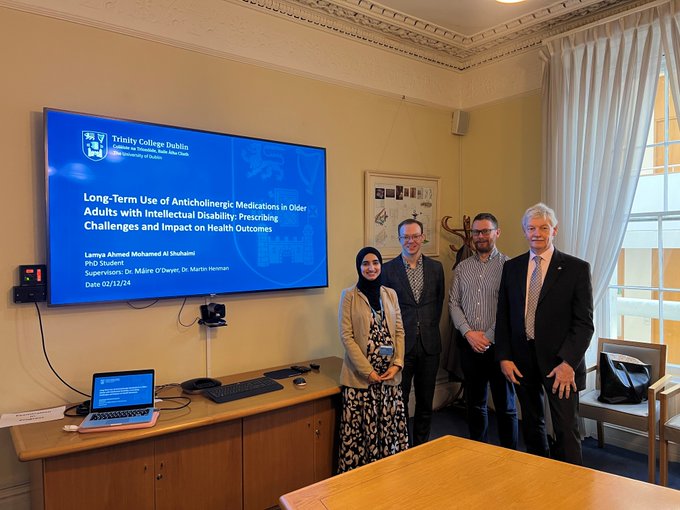
We are delighted that two IDS-TILDA team members successfully passed their recent vivas and have each been awarded a PhD. They are -
Dr. Fidelma Flannery - “Impacts on the mental health and wellbeing of older adults with an intellectual disability during the COVID-19 pandemic in Ireland.”
Dr. Lamya Al Shuhaimi - "Enhancing Medicine Use in Older Adults with Intellectual Disabilities”
We would also like to congratulate Slaney Bonniville Cox, Samira Bouktib Gogarty, Sarah-Jane Boyle and Elaine Moloney for achieving the highest end of year mark at distinction level in MSc in Ageing Health & Wellbeing in Intellectual Disability
We would also like to congratulate Dr. Darren Fitzpatrick on achieving the highest overall mark for Intellectual Disability Nursing in Junior Sophister as well as the highest overall mark for Junior Sophister as a whole.
Congratulations to them all for such fantastic accomplishments.

